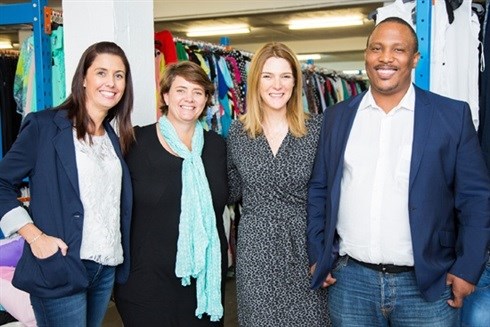
The latest outlet is based in Durban; this development adds another notch towards its increasing national reach. The NPO also has branches in Cape Town, Johannesburg, Paarl and Hermanus.
The Clothing Bank originated in Cape Town, and has grown significantly over the years, empowering unemployed women across the country to become financially and socially independent. It launched five years ago with a start-up capital loan of R1.5-million from Woolworths.
It receives surplus clothing garments from retailers such as Woolworths, which helped start the initiative in 2010 as part of its enterprise development programme. These clothes are subsequently sold on to unemployed women at a reduced price, to help them start their own small businesses, with the ongoing support of The Clothing Bank.
The benefits of the programme are two-fold: Firstly, it enables women to earn an income, while concurrently teaching them how to run a small retail trading operation and business skills.
Tracey Chambers, Chief Executive Officer of The Clothing Bank said she was proud of the progress made. "We started at grassroots level with just one branch, now we have opened a fifth branch in less than five years. Our graduate pool is also growing rapidly and we have put effective processes in place to ensure we remain connected with them and track the impact of our programme after they leave.
"To date, we have trained a total of 829 women. We also have the capacity to support 800 businesswomen a year. There are currently 362 women in training, with 330 recruited in 2014. We also meet the graduates on a monthly basis to ensure that they are exposed to business opportunities, in the past 12 months, the women have accumulatively generated profits worth R12,6-million, and since inception an amount of R29-million," she says.
The programme includes over 1000 hours of practical training, covering models such as monetary management, business and life skills. On completion, the new entrepreneurs start purchasing the merchandise from The Clothing Bank at significantly discounted prices, and proceed to sell the merchandise in their communities.
Lydia Gamanye, a graduate of The Clothing Bank, who worked for a company for 11 years before she was retrenched, said she was inspired to achieve success since joining the programme.
"This programme taught me all the necessary business skills I need. I am a single mother, yet I do not feel alone. I can take care of my mother and my sister's children because of this business."
Another graduate, Marethabile Aletta Modiko, said she was lucky to be chosen for The Clothing Bank. "My life has changed. I am now a well-known business woman in my community. I can provide for my family and they are proud of my success. I have learnt about record keeping, a skill that I will apply throughout all aspects of my life.
My plan is to be a successful, well-known businesswoman in the future, not only in my community but also in South Africa."
Other retailers have also come on board in a show of industry solidarity. Verna Botha-Richards, Mr Price Group Corporate Services and Sustainability Executive reiterated the group's sentiment: "We are proud to be a major partner of this wonderful initiative. The Clothing Bank is a real success story of how a social enterprise can create jobs, build self-esteem and have a positive impact on society while empowering previously-disadvantaged women."
The Clothing Bank programme has received a number of prestigious international awards: